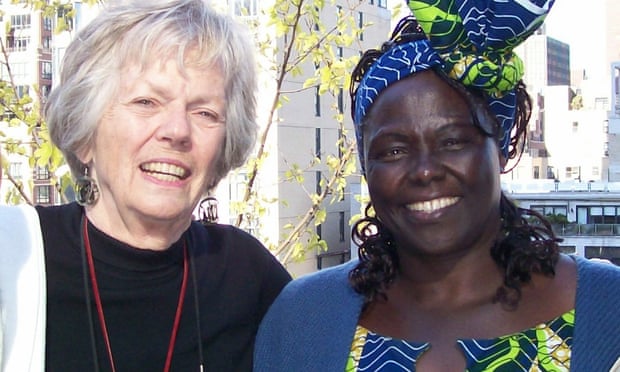Leading and Advocating for All Women
Margaret “Peg” Snyder, PhD
Founding Director of the United Nations Development Fund for Women (UNIFEM)
1994 Fulbright U.S. Scholar to Uganda

Dr. Margaret “Peg” Snyder (left) in 2006 with Kenyan Nobel Peace laureate Wangari Maathai, whose Green Belt Movement was one of the first programs to receive UN Women funding. Photo: The Guardian
Dr. Margaret “Peg” Snyder is known internationally as the “United Nations’ first feminist.” As the Founding Director of the United Nations Development Fund for Women (UNIFEM), known since 2011 as UN Women, she worked to promote and acknowledge women’s contributions to societies around the world.
Dr. Snyder completed a bachelor’s degree at the College of New Rochelle in 1950, and a master’s degree in sociology at the Catholic University of America in 1952, before being named the Dean of Women at Le Moyne College in Syracuse, New York. Inspired by John F. Kennedy’s call to action for young Americans to travel and volunteer overseas, she took a sabbatical to Tanganyika (present-day Tanzania). There she helped African students travel to the United States to study as part of the “Kennedy Airlifts.” After this experience she gave up her position at Le Moyne and decided to continue working in Africa.After completing a PhD in sociology from the University of Dar es Salaam in Tanzania in 1971, Dr. Snyder began working at the United Nations in Addis Ababa, Ethiopia. At the UN offices, women represented only 7% of local staff. Dr. Snyder worked to overcome resistance to women-led initiatives, in turn helping to acknowledge Ethiopian women as leaders of their communities. “There was a failure to realize,” she wrote in 2020, “that the most serious problems of development defy solution without the involvement of women.”

Dr. Snyder devoted her life’s work to the United Nations, with 20 years of service and an additional 30 years as an informal advisor. The programs she worked on and advised were responsible for channeling millions of dollars to women-led projects and organizations. The UN Development Fund for Women started as a small organization with a meager budget but grew exponentially under Dr. Snyder’s leadership —by the 1980s, the United Nations had women’s development commissions in 30 countries. At UN Headquarters in New York, Dr. Snyder was known for promoting women within the organization—her staff was composed of young women, whose careers she helped advance by utilizing her extensive network.

After officially retiring from the United Nations in the early 1990s, Dr. Snyder undertook a 1994 Fulbright U.S. Scholar award to Makerere University in Kampala, Uganda. The timing of her Fulbright was well-suited to her experience—she taught at the newly established Women’s Studies Program for master’s candidates at Makerere. As aptly stated by Comfort Lamptey, the Representative of UN Women to Nigeria, “Peg was a trailblazer. She believed that if you put money in the hands of women, they can do magic.”
Dr. Margaret “Peg” Snyder is remembered fondly by friends and colleagues for her contributions to women around the world. After Dr. Snyder’s passing in January 2021, Dr. Nancy Hafkin, former chief of research at the United Nations Economic Commission for Africa (ECA), wrote, “Peg shaped the way I learned to deal with the world: how not to be stopped by conventional limits, how to think outside of the box.”